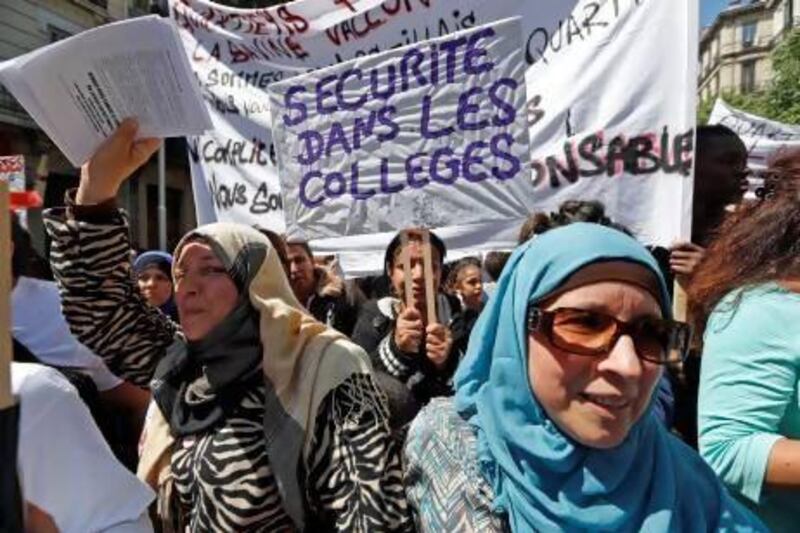MARSEILLE // Most mothers harbour worries about their children's futures.
In the northern suburbs of France's second city, Marseille, home to a large immigrant population with roots in the Muslim countries of the Maghreb, the concerns dwell too often on whether their sons will survive long beyond the age of 20.
Now, some of these women are fighting back. Desperate to break the cycle of drug trafficking and deadly turf wars into which teenagers and young men are drawn, they are also breaking omerta, the community code of silence that traditionally protects criminals.
The June 1 Collective is a group formed this year, and launched with a march on that date as the spate of gangland killings showed little sign of ending.
The total of murders so far this year stands at 13, only two lower than the figure for the same period of what the media call an "especially bloody 2012" and despite half the city having subsequently been declared a priority security zone.
Marseille is a beautiful and vibrant but also turbulent city where people of various origins generally get along well despite a political landscape that stretches from the rebellious political left to the racist far right.
Most residents can claim to be unaffected and even unconcerned by the bloodshed attributable to gangland rivalries. They are troubled only when a chase ends or an ambush happens near to their own homes, away from the rough "quartiers nord", as happened at the weekend when three men were wounded by gunfire outside a nightclub next to the city centre opera house.
But on the crime-ridden estates, there is despair at the extent of criminal behaviour and the relentless score-settling by Kalashnikov or knife.
Some local politicians have called for the army to be sent in or for the government to restore military service to bring discipline and focus to disenchanted young lives.
But the women's decision to emerge from the shadows to confront the killers, give information to the police and demand action from political leaders is the boldest initiative Marseille has seen.
Malika Ben Amar, 48, is one of these women.
Her son, Erwan, who had followed so many other boys of his district into delinquence, was murdered in 2010, just as he was showing signs, with a first job offering travel within France and a regular salary, of being able to lead a conventional life. He was 20.
Mrs Amar says she knew the killer's name within weeks. He was another lost son of the estates and had known Erwan since early childhood; they had even robbed and stood trial together. But turf wars over the right to deal drugs in specific parts of Marseille are so intense that someone may be killed in a dispute about a short stretch of the same street.
Erwan died from 10 stab wounds inflicted by a passenger aboard a scooter.
His mother says the driver, barely 15, was later sent by his parents to their native Algeria, presumably to distance him from revenge attacks. On his return, he had the audacity to invite Erwan's younger sister to dance with him at a party.
According to Mrs Amar, everyone from police to ordinary residents has long known the identity of her son's killer.
"At the moment of the murder, there were tens of people out and about . . . but not one of them wanted to be a witness," she told the French newspaper Le Journal du Dimanche.
Mrs Amar did not stop with the newspaper interview. She told French 2 television: "Enough is enough. It has to stop. We're completely fed up."
Yamina Benchenni, spokeswoman for the collective and a veteran of the 1983 March of the Beurs, when Arab immigrants demonstrated against discrimination, told the newspaper: "We can no longer keep quiet. It's our children we are burying."
She says she knows of five families threatened with reprisals if they do not provide safe keeping for drugs or firearms.
As the women's profile has grown, so has the interest of authorities.
France's justice minister, Christine Taubira, born in French Guiana, wants to summon the collective's leaders to a meeting in Paris.
"I have a lot of compassion and esteem for these mothers, some of whom have lost children," she said during a recent visit to Marseille.
She returned to Paris with a list of 23 demands for government action on employment, training, child protection and debt. The women also want help in moving out the estates, and educational alternatives to prison for young people.
"If young people had work, could go on holiday and do sport, they would not let themselves be sucked into the cycle of easy money," says Ms Benchenni.
In March, Erwan's mother, Malika Ben Amar, was reminded of present realities. She says she wanted justice and closure, not revenge, for Erwan's death. But a phone call alerted her to a double killing, at the foot of a tower block named after blueberries.
Both victims were 21; one was the man Mrs Amar says everyone knows was her son's killer.
foreign.desk@thenational.ae
For breaking news from the Gulf, the Middle East and around the globe follow The National World on Twitter. Follow us
Muslim mothers break code of silence to save a generation
In the northern suburbs of Marseille, home to a large Muslim population with roots in the Maghreb, mothers' concerns too often dwell on whether their sons will survive beyond the age of 20. Colin Randall reports

Editor's picks
More from the national






